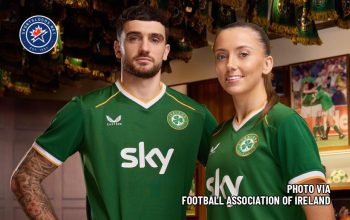
While they won’t be able to explicitly support the LGBTQ+ community, team captains at this summer’s FIFA Women’s World Cup in Australia and New Zealand will be able to highlight one of eight social issues in their games.
FIFA announced last week that, through their Football Unites the World global campaign, eight different armbands will be available to captains at this summer’s tournament, including:
- Unite for Inclusion – in partnership with UN Human Rights
- Unite for Indigenous Peoples – in partnership with UN Human Rights
- Unite for Gender Equality – in partnership with UN Women
- Unite for Peace – in partnership with UNHCR, the UN Refugee Agency
- Unite for Education for All – in partnership with the UN Educational, Scientific and Cultural Organization (UNESCO)
- Unite for Zero Hunger – in partnership with the UN World Food Programme
- Unite for Ending Violence Against Women – in partnership with UN Women
- Football is Joy, Peace, Love, Hope & Passion – in partnership with the World Health Organization (WHO)

FIFA said in its announcement that the highlighted social causes were chosen “following extensive consultation with stakeholders including players and the 32 participating member associations.”
“Football unites the world and our global events, such as the FIFA Women’s World Cup, have a unique power to bring people together and provide joy, excitement and passion. But football does even more than that – it can shine the spotlight on very important causes in our society. After some very open talks with stakeholders, including member associations and players, we have decided to highlight a series of social causes – from inclusion to gender equality, from peace to ending hunger, from education to tackling domestic violence – during all 64 matches at the FIFA Women’s World Cup.”
— FIFA president Gianni Infantino

Captains can wear a Football Unites the World armband for the entire tournament, wear one armband corresponding to the theme of their choice for the entire tournament, or wear an armband corresponding to the theme of each specific matchday.
“It’s not just about what happens on the pitch. We are committed to using football’s power as a force for good and leveraging our partnerships with United Nations agencies to achieve our goals. We want to say thank you. Thank you to the players and the teams for sharing your support, for these causes. United, we can make a difference.”
— FIFA secretary general Fatma Samoura
The move comes after FIFA banned men’s team captains from wearing One Love armbands in support of the LGBTQ+ community at the World Cup in Qatar last winter. Some women’s teams had also made requests to FIFA to wear the One Love armbands at the Women’s World Cup, which were also denied.

The 2023 FIFA Women’s World Cup kicks off on July 20 with co-hosts Australia and New Zealand facing Ireland and Norway, respectively. The final will be played on August 20 at Stadium Australia in Sydney.











